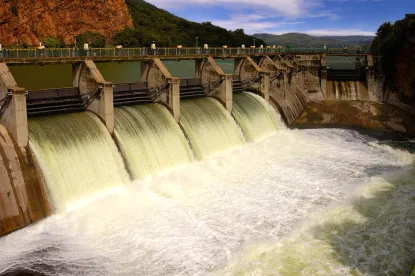Michigan Seeks Damages from FERC-Exempted Project for Dam Safety Reservoir Drawdown
The State of Michigan has filed a complaint in State court (Mich. 30th Jud. Cir. Ingham Cnty. Case No. 22-0150-CE Mar. 1, 2022) against the holder of a Federal Energy Regulatory Commission (FERC or Commission) exemption from licensing for damages resulting from the exemptee’s emergency reservoir drawdown to correct a dam safety problem. In the lawsuit two Michigan State agencies claim that the dam owner and operator, affiliate companies, released hundreds of thousands of cubic yards of sediment as a result of the reservoir drawdown, thereby violating several State environmental laws, killing fish and wildlife and taking State public trust property, and creating a public nuisance. The State is seeking declaratory relief regarding the violations of State law, monetary damages for destruction of natural resources, and civil penalties. The complaint asserts that certain State law exceptions for FERC-licensed projects do not apply to exempted projects, but otherwise does not acknowledge potential conflicts between FERC regulation of the project and State environmental laws. The case raises questions about the ability of a third party to challenge FERC regulation through a collateral attack in State court seeking monetary damages and civil penalties, and the potential preemptive effect of the Federal Power Act on State environmental laws.
FERC Supplements Notice of Technical Conference on Financial Assurances
On February 15, FERC issued a supplemental notice regarding the financial assurances technical conference to be held virtually on Tuesday, April 26, 2022. The supplement provided an agenda outlining the topics each panel will be discussing:
-
Panel 1 will focus on how financial assurances can mitigate safety risks associated with hydro facilities. It will examine project-specific, regional, and global risks such as aging infrastructure and stress from climate change, and these risks can impact the communities where projects are located.
- Panel 2 will be on establishing the financial assurance requirement. The panelists in this discussion could inform the Commission on the metrics and methodologies that should be considered, as well as the appropriate amount of financial assurance that the Commission should require.
- Panel 3 will explore the mechanisms that licensees can use to meet a financial assurance requirement. It will be an in-depth discussion on financial instruments and how or if FERC can determine the financial viability of a project.
Panelists have not yet been announced, but more details will be available as the conference date approaches.
Tribes Get $1.7 Billion for Water Rights Settlements
The U.S. Department of the Interior (DOI) announced on February 22, 2022 that more than a dozen Native American Tribes will receive $1.7 billion in federal funding for water rights settlements and water infrastructure projects. A majority of the funding, $998 million, is allocated to the Confederated Salish and Kootenai Tribes (CSKT) for the Montana Water Rights Protection Act, which settles claims to water rights between the United States, Montana, and CSKT. The Act further provides for the rehabilitation of the federal Flathead Indian Irrigation project and construction of new community water and wastewater infrastructure. Other beneficiaries of the funding are: $205 million for the Navajo-Utah Water Rights Settlement Act; $109 million for the White Mountain Apache Tribe Water Rights Quantification Act; $123 million for the Navajo-Gallup Water Supply Project; and $155 million for the Blackfeet Water Rights Settlement Act.
DOI Reverses Two Key Trump Era Legal Opinions
In the space of two weeks, DOI has reversed two Trump Administration legal opinions with important implications for land and water use.
In a February 4, 2022 Solicitor’s Opinion, DOI reconfirmed its pre-Trump legal position that submerged lands beneath the original bed of the Missouri River did not pass to North Dakota at the time of statehood under the Equal Footing Doctrine because the riverbed and associated mineral rights were held in trust by the United States for the Three Affiliated Tribes of the Fort Berthold Reservation. The Solicitor’s Opinion, relying on principles of treaty construction that favor Tribes, concluded that the Tribes negotiated for a reservation that included that part of the Missouri River that passes through the reservation, which was later impounded by the U.S. Army Corps of Engineers’ Garrison Dam to create Lake Sacakawea, and that the reservation included the submerged lands. The State of North Dakota has made a competing claim to the extensive oil and gas reserves in the submerged lands.
On February 18, 2022, the Solicitor issued another opinion withdrawing a Trump Solicitor’s Opinion on which the Bureau of Land Management had relied in its determination that a proposed water pipeline was within the scope of a railroad right-of-way under the 1875 General Railroad Right-of-Way Act. The new Solicitor’s Opinion rejects the interpretation that railroad companies received the right to authorize third parties to use their easements for any purpose that did not interfere with railroad operations. Developers seeking to use railroad easements for other linear infrastructure such as water pipelines or electric transmission lines crossing federal lands would have to obtain their own rights-of-way under applicable statutes, as a result of the Solicitor’s Opinion.
Perspectives by Mike Swiger*
Russia’s invasion of Ukraine is a stark reminder that there are things greater than ourselves and our own domestic problems in the world. While we debate policy issues such as how best to move toward a decarbonized energy future, we should not lose track of the importance of energy independence as a key element of that future. Whether it be lithium for batteries, silicon wafers for solar panels, turbines for new hydropower construction, or liquified natural gas for electric generation, over-dependence on the global supply chain is a risky strategy. Our liberty and our ability to help defend the liberty of others around the world is tied in part to energy independence, so that no country can hold our international political choices hostage to our need for affordable energy. Encouraging new domestic hydropower and upgrading and preserving the existing hydropower fleet are part of the energy independence picture. While it might be convenient to rely on others to develop needed energy infrastructure in their “back yards” and keep it out of ours, that is a short-sighted approach and one that does not promote our liberty
*The opinions expressed in this article do not necessarily represent the views of Van Ness Feldman or its clients, but only the views of the author.






 />i
/>i
